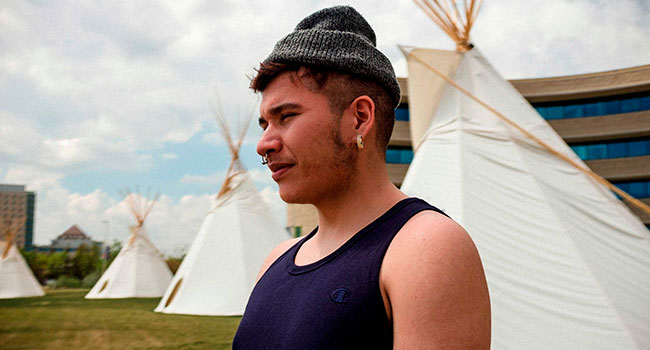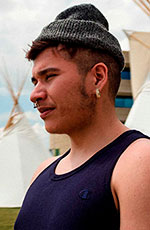Success was running Billy-Ray Belcourt ragged in the months before COVID-19.
The Indigenous poet, scholar and national literary sensation was constantly on the road, attending literary festivals and making other appearances related to his two hit volumes of poetry – all while wrapping up a doctorate and adapting to his new role as professor of creative writing at the University of British Columbia.
And he’s only 25.
“I was travelling so much I felt I was actually avoiding my life,” said Belcourt, who is graduating this month with a PhD from the Department of English and Film Studies at the University of Alberta.
“I’d put everything on pause and was living out of hotels and in airports. I just pulled out of any sort of sustainable rhythm of life.
“In a weird way the pandemic allowed me to remap my way of living. I don’t have the same degree of intimacy with readers as when I was doing all these events, but I do think I’m better for being more grounded.”
It’s no wonder Belcourt was feeling the pressure. He’s been on the career fast track since he was an undergraduate in the Faculty of Arts.
Raised by his grandmother on the Driftpile Cree Nation reserve in northwestern Alberta, he enrolled in comparative literature, quickly becoming an advocate for LGBTQ and Indigenous communities and serving as president of the U of A’s Aboriginal Student Council.
In 2015 he became the first First Nations student from the U of A to win a Rhodes Scholarship at Oxford University, where he completed a one-year master’s degree in women’s studies, looking at the role of Indigenous women in social resistance movements such as the Dakota Access Pipeline protests of 2016.
While he felt Oxford’s Eurocentric focus didn’t make for the best intellectual fit with his scholarly focus, he managed to devote part of his time there to writing his debut poetry collection. Called This Wound is a World, it won Canada’s most illustrious poetry honour in 2018 – the Griffin Poetry Prize. He was the youngest recipient ever at 23.
An honest and raw account of growing up gay and Indigenous in Western Canada, the book became a national hit. It was selected by CBC as one of the 10 best Canadian poetry books of 2017, by Prism International among its Best Books of 2017, by the Canadian League of Poets as one of the Ten Must-Read Books of 2017 and by the Writers’ Trust of Canada among its 2017 Best Books of the Year.
All of that was followed by the 2018 Indigenous Voices Award for “most significant work of poetry in English.”
Belcourt describes his thesis – called The Conspiracy of Indian Joy and supervised by Keavy Martin – as “an autobiographical and theoretical examination of the ways Indigenous peoples lead joyful lives despite – and in opposition to – the long history of colonization, which continues to seek to flatten the emotional lives of Indigenous people.”
He argues that “the general public has been empowered by history to think of us inside particular grammars, usually of deficiency or disrepair. That means that they aren’t able to see the ways that we do practise joy … or the minor ways, as Indigenous peoples, we care for one another, gather and laugh.
“A theory of joy is a theory of freedom,” he adds, “because what is more joyous than freedom? It’s actually an incredibly urgent task to reconfigure our understandings of Indigenous life to see that, at our core, we are people who want joy.”
His doctorate also explores the flip side of Indigenous joy, including currents of the paranormal and motifs of haunting – as manifest, for example, in the residential school experience – “as a larger condition of colonial modernity.
“There are kinds of horror that are symptomatic of colonization,” he said. “Indigenous peoples and other racialized populations live, in varying degrees, with the horror story of conquest.”
While working on his thesis, Belcourt also produced another volume of poetry called NDN Coping Mechanisms, which won an Alberta Literary Award last summer and was long-listed for Canada Reads.
If that weren’t enough, there is his 2020 collection of autobiographical essays published with Penguin Canada, A History of My Brief Body. So far it’s “had great press in the U.S.,” said Belcourt, including mentions in Oprah Magazine and the Washington Post.
He now has a contract with Penguin Canada to write two novels, slated for release in 2022 and 2024. Both are set in Edmonton.
The first deals with police violence and the over-incarceration of Indigenous peoples.
The second is “a queer Indigenous love story” featuring characters who meet in a U of A seminar.
“I think Edmonton is a place I will always write about, where I’m most comfortable and which I feel compelled to write about,” said Belcourt. “Edmonton will always be somehow in my life.”
His new job as an assistant professor at UBC involves teaching creative writing “with a literary studies bent.” He has two small seminars this fall where “we’ve been able to manufacture some sort of little sanctuary,” he said, amidst the strictures of the pandemic.
“The books we’re reading are incredibly powerful and socio-politically attuned to the world, so it’s enriching, and I feel really lucky that I have this time to carve out with these students.”
As for the years spent coming of age in meteoric fashion at the U of A?
“I do feel really indebted to friends I made at the U of A, and to my professors. They allowed me to do a project that was unconventional, and to theorize from lived experience.”
| By Geoff McMaster
This article was submitted by the University of Alberta’s online publication Folio, a Troy Media content provider partner.
The views, opinions and positions expressed by columnists and contributors are the author’s alone. They do not inherently or expressly reflect the views, opinions and/or positions of our publication.



